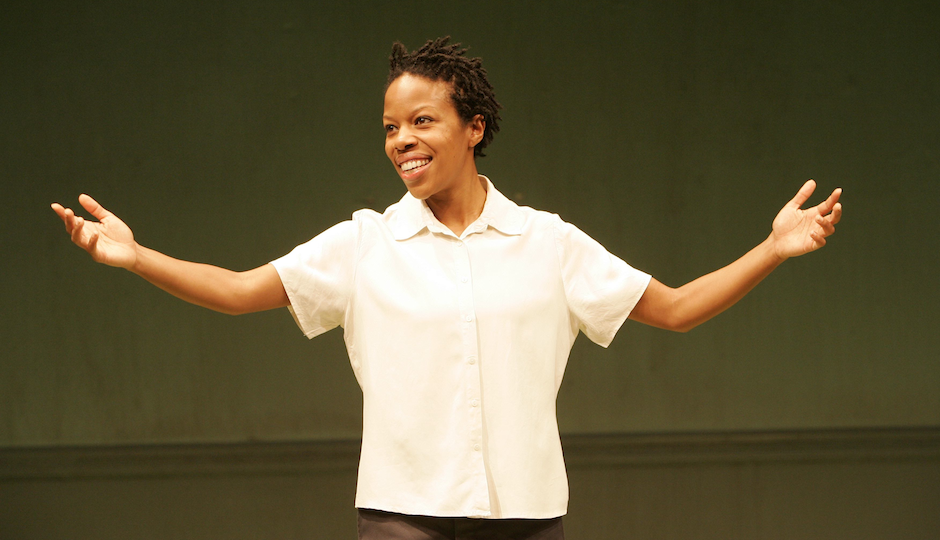Obie-Winning Actress Nilaja Sun on the Dangers of “Restricting the Arts Flow”

Sun in “No Child.”
“Oh, honey, you got an actor out of bed before noon!”
Nilaja Sun and I both chuckle pretty loudly.
“You were an actor too, weren’t you?” she asks.
I was sort of stunned. I told her I was for about three years right after high school.
“Oh, I could tell,” she says. “That prolonged laugh and that voice of yours gave that away!”
That’s how we start our 9 am phone conversation about Sun’s work as a teaching artist and actress. Sun has a host of television credits to her name, everything from The Good Wife to Nurse Jackie to Madam Secretary, but in the theatre world, she’s best known for her award-winning solo show No Child, which took New York by storm in 2006. In some ways, that work—about a teaching artist in a Bronx school—is reflective of Sun’s own passion for helping others unlock their inner stories. She’s been teaching since 1997, when, to use her words, she was a “wee little thing.”
“I’m so thankful to be an actor, but so many people know me as the actor,” she says. “I’ll say it a million times: I am on this Earth not only to be an actor and shine a light on invisible communities, but also as a teacher to bring out stories that people feel like they have locked in. If I can at all free someone’s imagination or heart or soul, if I can place meaning into something that seems dull or nonexistent, that is when this teacher is most happy.”
Lucky enough for Philly, Sun is heading to town to do some of that locksmithing into people’s inner stories. She’ll be presenting a workshop with PlayPenn on creating solo theater work, and it is a lot more than just standing on the stage and reciting monologues. It’s a process, she says, and a vital one: She suggests that the actor is often “the last one to the table” and has to work magic with someone else’s words. The solo show is a different animal.
“You, as the actor, have the responsibility and the opportunity to create your own vehicle and allow it to represent what you want to represent as a performer,” she says. “It’s all about what kind of story you want to tell and how you want to tell that story.”
There’s also the emotional element of solo work that is probably the most critical, according to Sun. In short, she says, “If you don’t tell this story, this piece, you will die.”
“I’m going to be tapping into their souls to find out what story needs to be told, not what story the world has created,” she adds. “It’s really got to be deep, heart work. You have to be as honest as possible in your work because we all have hearts and souls, and the hearts and souls of the audience will pick up that honesty.”
That takes us back to Sun’s No Child, which hits surprisingly close to home: It’s become almost a daily headline that schools are cutting arts programming in what seems to be a never-ending battle to balance budgets. No Child showed the power of how writing, how storytelling, how theatre, can ultimately change a young person’s life. But Sun believes there is a common misnomer in the “arts in schools” argument.
“I want to say, ‘Guys, you do understand I’m not saying that the arts have to be 24/7?'” she says. “There are so many arts educators out there who would love to teach without it being a ‘nuisance’ or ‘in the way.’ It’s always the first thing on the chopping block. It makes our country and our cities smaller when you choose to restrict the arts flow.”
[The arts] teach students how to be human,” she adds. “That’s what the arts do: They remind you, especially for these students from these impoverished neighborhoods, that there’s a whole world out there! They are breathing the same air. They need to learn about bigger thoughts.”
Nilaja Sun will be presenting her “Introduction to Solo Work” workshop at PlayPenn on January 23rd and 24th. Information and registration can be found here.
Keep up to date with Ticket’s local arts, culture and events coverage. Here’s how:


